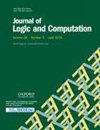Implicit commitment in a general setting
IF 0.7
4区 数学
Q3 COMPUTER SCIENCE, THEORY & METHODS
引用次数: 0
Abstract
Gödel’s Incompleteness Theorems suggest that no single formal system can capture the entirety of one’s mathematical beliefs, while pointing at a hierarchy of systems of increasing logical strength that make progressively more explicit those implicit assumptions. This notion of implicit commitment motivates directly or indirectly several research programmes in logic and the foundations of mathematics; yet there hasn’t been a direct logical analysis of the notion of implicit commitment itself. In a recent paper, we carried out an initial assessment of this project by studying necessary conditions for implicit commitments; from seemingly weak assumptions on implicit commitments of an arithmetical system $S$, it can be derived that a uniform reflection principle for $S$—stating that all numerical instances of theorems of $S$ are true—must be contained in $S$’s implicit commitments. This study gave rise to unexplored research avenues and open questions. This paper addresses the main ones. We generalize this basic framework for implicit commitments along two dimensions: in terms of iterations of the basic implicit commitment operator, and via a study of implicit commitments of theories in arbitrary first-order languages, not only couched in an arithmetical language.一般情况下的隐含承诺
哥德尔的不完全性定理表明,没有一个单一的形式系统能够捕捉到一个人数学信念的整体,同时指出了一个逻辑强度不断增强的系统层次,这些系统使这些隐含的假设越来越明确。这种隐含承诺的概念直接或间接地推动了逻辑和数学基础方面的几个研究项目;然而,对于隐性承诺的概念本身,还没有一个直接的逻辑分析。在最近的一篇论文中,我们通过研究隐含承诺的必要条件,对该项目进行了初步评估;从算术系统$S$的隐含承诺的看似较弱的假设中,可以导出$S$的一致反射原理——声明$S$定理的所有数值实例都是真的——必须包含在$S$的隐承诺中。这项研究提出了尚未探索的研究途径和悬而未决的问题。本文论述了主要问题。我们沿着两个维度推广了隐式承诺的基本框架:根据基本隐式承诺算子的迭代,以及通过研究任意一阶语言中理论的隐式承诺,而不仅仅是用算术语言表达的。
本文章由计算机程序翻译,如有差异,请以英文原文为准。
求助全文
约1分钟内获得全文
求助全文
来源期刊

Journal of Logic and Computation
工程技术-计算机:理论方法
CiteScore
1.90
自引率
14.30%
发文量
82
审稿时长
6-12 weeks
期刊介绍:
Logic has found application in virtually all aspects of Information Technology, from software engineering and hardware to programming and artificial intelligence. Indeed, logic, artificial intelligence and theoretical computing are influencing each other to the extent that a new interdisciplinary area of Logic and Computation is emerging.
The Journal of Logic and Computation aims to promote the growth of logic and computing, including, among others, the following areas of interest: Logical Systems, such as classical and non-classical logic, constructive logic, categorical logic, modal logic, type theory, feasible maths.... Logical issues in logic programming, knowledge-based systems and automated reasoning; logical issues in knowledge representation, such as non-monotonic reasoning and systems of knowledge and belief; logics and semantics of programming; specification and verification of programs and systems; applications of logic in hardware and VLSI, natural language, concurrent computation, planning, and databases. The bulk of the content is technical scientific papers, although letters, reviews, and discussions, as well as relevant conference reviews, are included.
 求助内容:
求助内容: 应助结果提醒方式:
应助结果提醒方式:


